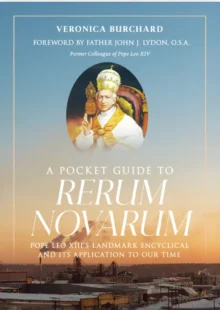Like many, I became interested in learning more about Rerum Novarum, the encyclical known as the foundation of modern Catholic Social Teaching, when our new pope chose the new Leo. Leo XIV even explained to the College of Cardinals that his choice of name was mainly inspired by Leo XIII’s authorship of Rerum Novarum! The encyclical is often remembered as a bold defense of workers’ rights—a prophetic response to the injustices of the industrial age and a call for employers to uphold the dignity of labor.
While Leo XIII certainly affirmed the moral obligations of employers, what is less widely known is that he also addresses the responsibilities of workers. And since many if not most people are employees rather than employers, this forgotten half of Rerum Novarum deserves a closer look!
Mutual Responsibilities
It’s easy to think of Catholic Social Teaching as a one-way street, focusing only on the duties of the rich and powerful towards the poor and vulnerable. But our beautiful Catholic Faith is always about harmony and relationships. It is always both/and, which means wage-earners also have duties. What are they, and how do they in fact apply to everyone, from entrepreneurs, to stay-at-home parents, and to wealthy business owners?
Leo XIII makes the case that ALL Christians have the duty to live frugally and use resources wisely for the sake of their families and the common good. The resources most people have come first and foremost in wages. So let’s look at how Rerum Novarum defines what today we would call a “living wage” (bold added for emphasis:)
Let the working man and the employer make free agreements, and in particular let them agree freely as to the wages; nevertheless, there underlies a dictate of natural justice more imperious and ancient than any bargain between man and man, namely, that wages should support a frugal and well-behaved wage-earner….If a workman’s wages be sufficient to enable him comfortably to support himself, his wife, and his children…
A just wage is clearly defined here as one which is freely agreed upon, but that is enough to support a morally upstanding worker and his family. Now here is where the harmony comes in. If the wage is enough to do that, Leo continues:
He [the workman] will find it easy, if he be a sensible man, to practice thrift, and he will not fail, by cutting down expenses, to put by some little savings and thus secure a modest source of income. Nature itself would urge him to this. We have seen that this great labor question cannot be solved save by assuming as a principle that private ownership must be held sacred and inviolable.…
We don’t always hear much about this, but Catholic Social Teaching not only emphasizes property ownership as a natural right, but also (and by the same reasoning), places demands on what employees do with their earnings.
Leo bases his argument on Christian anthropology and natural law. It is a “sacred law of nature,” he explains, that a father must provide for his children. And therefore, human beings–rich and poor alike–have the right to private property. And unlike any other animal, man has the ability and the responsibility to plan for his and his family’s future. Property rights flow in part from these responsibilities. It is only through the right to own property, Leo XIII continues, that the needy will be able to improve their situation.
Everyone is further called to contribute to the common good of the broader community in a way that corresponds to their situation. “It should not be supposed that all can contribute in the like way and to the same extent. No matter what changes may occur in forms of government, there will ever be differences and inequalities of condition in the State. Society cannot exist or be conceived of without them.”
Rerum Novarum’s Message to Us Today
Ultimately, then, what message does Leo XIII have for those of us today, whether we are writing paychecks or cashing them?
First, to remember that there is no disgrace in lacking wealth: “As for riches and the other things which men call good and desirable, whether we have them in abundance, or are lacking in them-so far as eternal happiness is concerned – it makes no difference; the only important thing is to use them aright.” Leo reminds us that Christ Himself became poor, and that riches are more likely to hinder one’s path to heaven than help it. Ultimately, “God has not created us for the perishable and transitory things of earth, but for things heavenly and everlasting.”
Leo also asks us to put no faith in promises of a utopia, or collectivist claims that redistributing wealth will bring about equality. He condemns socialism a half-dozen times, saying it “must be utterly rejected, since it only injures those whom it would seem meant to benefit…” So instead of giving in to coveting or envy, remember that controlling the fruits of our own labor is what allows everyone to direct the course of our own lives. Answer Leo XIII’s direct call by paying yourself first, as they say: saving and investing some amount each month, no matter how small. And if you are able-bodied and on taxpayer-funded assistance, do all you can to free yourself from that dependency. Make wise use of the resources you do have out of respect for your neighbors.
Next, to remember that work has intrinsic value, and labor is good. Families can and should question the assumption that everyone must have a college degree to be successful. Investigate vocational and trade schools, apprenticeships, and the like.
Finally, do an honest assessment of your financial decisions in light of Leo’s call. Remember the duty to be a “well-behaved wage earner” and that every economic choice carries moral weight. Weekly meal-planning, buying in bulk, and never wasting food makes you a good steward of resources. Assess what you purchase at the grocery store versus what you actually consume. If you’re throwing out the same items each week (perhaps bagged lettuce, or other healthy food you feel you “should” be buying), resolve to eat what you buy. (Or don’t buy it next time). For clothing, buying gently-used outwear off-season not only stewards the earth’s resources, but saves money and can be a special help to large families.
Living arrangements also deserve a look. Why do we assume that young adults must live independently at age 18? Leo XIII was writing prophetically not just about conditions in factories, but also in families. He saw fathers, mothers, and even children being drawn out of their homes and into the labor pool. Could there be some clues in Pre-Industrial Revolution life for us, especially in multi-generational living? A young married couple who lives with in-laws for a few years builds precious memories along with a down-payment fund.
Through it all, practice gratitude. There is no shame in lacking wealth, but it helps to recall that the quality of life available to the average person today was unheard of even just a few generations ago. Innovations we can take for granted today such as hot showers, indoor plumbing, refrigeration, eyeglasses, and dental care, to name just a few, were either unheard of or luxuries for the ultra-wealthy.
And how are the wealthy today to ensure they use their abundance aright? Leo explains “No one is commanded to distribute to others that which is required for his own needs and those of his household; nor even to give away what is reasonably required to keep up becomingly his condition in life….But, when what necessity demands has been supplied, and one’s standing fairly taken thought for, it becomes a duty to give to the indigent out of what remains over….It is a duty, not of justice (save in extreme cases), but of Christian charity – a duty not enforced by human law.”
Far from offering a one-sided critique, Rerum Novarum calls for mutual respect, duty, and virtue, and presents a vision of social harmony that can be lived out in the first society: the family.
Learn More About Rerum Novarum
Image: Photo by Vitolda Klein on Unsplash












